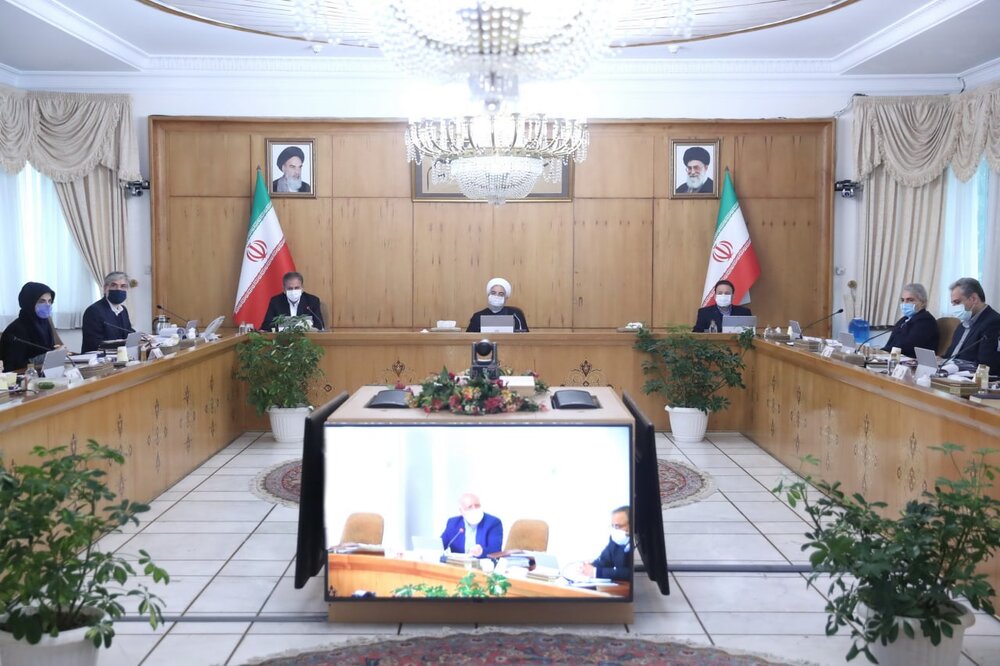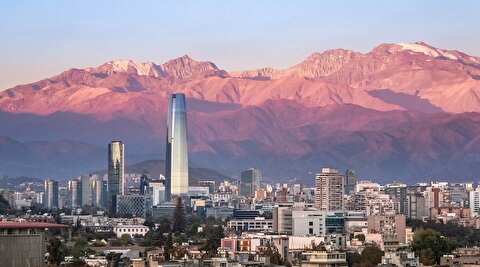
Cabinet holds extraordinary meeting to review next year’s budget bill

At the meeting, which was held in full compliance with health and safety protocols, after outlining general strategies and policies by the president, the cabinet began reviewing the national budget bill for the year 1400.
As reported, 15 cabinet members were attending the meeting while the rest followed through video conference.
President Rouhani had previously said that the main goal of the national budget bill for the next year is to downsize the government and cut the direct dependence on oil incomes.
Speaking in a session of the Resistance Economy Headquarters earlier this month, the president said that the next year’s budget bill will be drafted within the framework of the general program of reforming the budget structure and general policies of the resistance economy.
Last week, the Head of Iran’s Planning and Budget Organization (PBO) Mohammad-Baqer Nobakht said his organization was considering $40 oil for preparing the national budget bill for the next year.
"We have not yet determined the oil price based on which the budget will be set, but the initial estimation is around $40 a barrel," he said.
Addressing the press after a cabinet meeting, Nobakht had announced the approval of the budget for the next Iranian calendar year 1400 by the government and added the budget bill will be submitted to the parliament within the legal deadline and before December 5.
The bill will be prepared based on the U.S. dollar exchange rate at 110,000-115,000 rials, he said.
The budget resources for the next year will be supplied from oil, taxation, and issuance of government bonds, Nobakht explained.
“Regarding the oil revenues, the ceiling will be set considering the amounts that we will be able to export in optimal circumstances and also considering the amount of exports we have had in the current year,” he said.
According to the official, any surplus revenues earned in this area will not be spent on current expenses but will be used for development projects, urban transportation, e-government development, strengthening knowledge-based companies, and strengthening the health transformation plan.


Gold price eases after Trump downplays clash with Fed chair Powell

Copper price hits new record as tariff deadline looms

Brazil producers look to halt pig iron output as US tariff threat crimps demand

Three workers rescued after 60 hours trapped in Canada mine

Gold price could hit $4,000 by year-end, says Fidelity

Chile’s 2025 vote puts mining sector’s future on the line

US targets mine waste to boost local critical minerals supply

Energy Fuels surges to 3-year high as it begins heavy rare earth production

Glencore workers brace for layoffs on looming Mount Isa shutdown

Trump tariff surprise triggers implosion of massive copper trade

Maxus expands land holdings at Quarry antimony project in British Columbia

BHP, Vale accused of ‘cheating’ UK law firm out of $1.7 billion in fees

Southern Copper eyes $10.2B Mexico investment pending talks

American Tungsten gets site remediation plan approved for Ima mine in Idaho

Kinross divests entire 12% stake in Yukon-focused White Gold

Gold price could hit $4,000 by year-end, says Fidelity

Southern Copper expects turmoil from US-China trade war to hit copper

Ramaco Resources secures five year permit for Brook rare earth mine in Wyoming

Column: EU’s pledge for $250 billion of US energy imports is delusional

Trump tariff surprise triggers implosion of massive copper trade

Maxus expands land holdings at Quarry antimony project in British Columbia

BHP, Vale accused of ‘cheating’ UK law firm out of $1.7 billion in fees

Southern Copper eyes $10.2B Mexico investment pending talks

American Tungsten gets site remediation plan approved for Ima mine in Idaho

Kinross divests entire 12% stake in Yukon-focused White Gold

Gold price could hit $4,000 by year-end, says Fidelity

Southern Copper expects turmoil from US-China trade war to hit copper

Ramaco Resources secures five year permit for Brook rare earth mine in Wyoming














